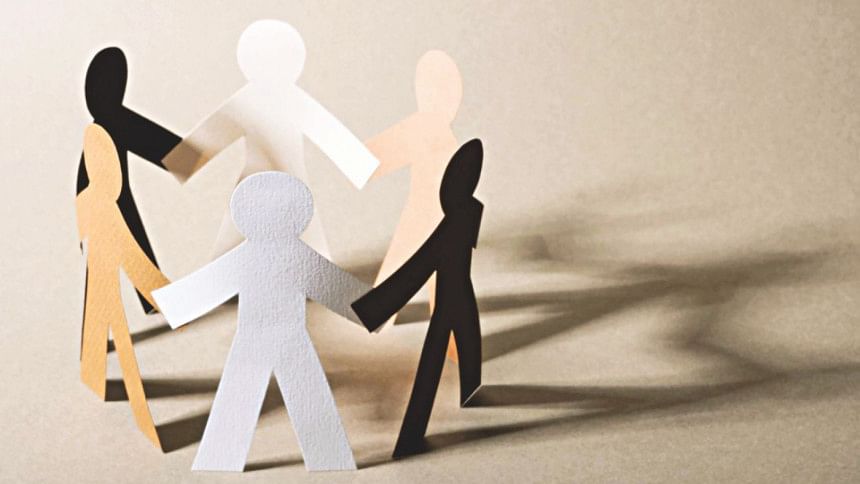Let's not forget our social values

Social values form the basic foundation of a nation. The values define what is acceptable in a society and determine the behaviour of the people. Social values are however not static and can change over time based on what beliefs and attitudes people embrace as they move on.
There are certain values such as truthfulness, honesty and compassion which are universal and most people would support the necessity of these at any cost. Today, if we look at our society, can we say we are serious enough to preserve the basic values that we once held in such high esteem?
One would assume the more the deviation from these values, the higher the possibility of a society to accept wrongdoings resulting in frustration, anxiety and psychological trauma. The human brain tends to accept what is right and reject what is wrong. The brain, when confronted with lies, abuses and dishonesty, sends shockwaves through the body.
The question is: why do we need to resort to dishonesty and unscrupulous means to achieve our ends? The answer is: to derive individual benefits at the expense of others. When individuals are voluntarily or forcibly swayed towards ill-motivated desires, more and more people see the financial benefits, leading it to snowball into a larger group which could make it difficult for the regular legal and law enforcement mechanisms to deal with them.
Moral education of children at a younger age is believed to be a way to strengthen social values. The family, schools and the community leaders have the prime responsibility to bring up children as ideal citizens. Without those moral building blocks, when a child grows up, they lack the ability to differentiate good from evil. Alongside academic subjects, moral education is a necessity which has not lost its appeal despite modernisation of societies. Moral education can inculcate in the young minds ethical values such as integrity, truthfulness, love, tolerance, wisdom, kindness, respect, sympathy, hospitality, cooperation, compassion, forgiveness and charity. These values are essential in bringing children up to be responsible citizens and be dedicated to one's work, family and community lives. In primary school, we used to recite character-building poems from a book titled Adorsho Lipi such as "Shokale uthiya ami mone mone boli, shara din ami jeno bhalo hoye choli" (Every morning I wake up, I tell myself that I must spend the day in a disciplined manner). But children today do not get such moral education in many schools.
Parents and teachers should also encourage children to pursue hobbies that are self-fulfilling and enjoyable, such as games and sports, stamp collection, music, debating, scouting, gardening and tree plantation, etc., to keep them away from bad habits. With the fast degradation of social values, behaviour and attitudes of people are changing. As an example, let's look at how children's attitude towards eating and sleeping hours is changing. Many kids nowadays stay up at night studying, watching movies or simply gossiping on the phone and then spend most of the day sleeping. This results in them missing their breakfast which affects their physical and mental health. The harmful effect of this practice was not well-known until the Nobel Prize in medicine was awarded to three researchers: Jeffrey C Hall, Michael Rosbash and Michael W Young in 2017 for proving that this type of disorderly lifestyle can cause serious damage to one's health. The three scientists, after decades of research, discovered that a gene controls the rhythm of all living beings and that there is a biological clock inside the body. The researchers explained how plants, animals and humans adapt to their biological rhythm so that it is synchronised with the earth's revolutions. They confirmed that the gene encodes a protein that accumulates in cells at night and then degrades during the day. Our inner clock adapts to our physiology during different times of the day and it regulates critical functions such as behaviour, hormone levels, sleep, body temperature and metabolism. Sleeping during the morning hours interferes with this natural order which can cause various health problems including high blood pressure and heart problems. This is just one of many examples of how changing behaviour and lifestyle of children in today's age—which may seem innocuous at first glance—due to indiscipline can have far-reaching effects.
One who sticks to his or her moral values retains good character and remains disciplined. It is thus important for us, as a society, to inculcate in our children strong social values and ethical practices. While money is important, it cannot be the only goal in life. The following saying, "If wealth is lost nothing is lost; if health is lost something is lost; when character is lost all is lost," encapsulates the essence of good social values.
It is regrettable that social values are fast eroding in Bangladeshi society today. Greed and materialistic attitudes are overtaking our traditional values. As a result, chaos, conflict and corruption have taken hold. We need a moment of introspection and look at where we are today. Maybe then we will realise that as adults, it is time to shun socially unacceptable behaviour so that we can set the right example for our children. Without preserving a set of basic values, we will not achieve our collective political, economic and social goals. Let the virtues of hard work, fairness and honesty prevail.
Dr Nawshad Ahmed is an economist and urban planner. He worked previously as a UN official in Bangladesh and abroad.





Comments